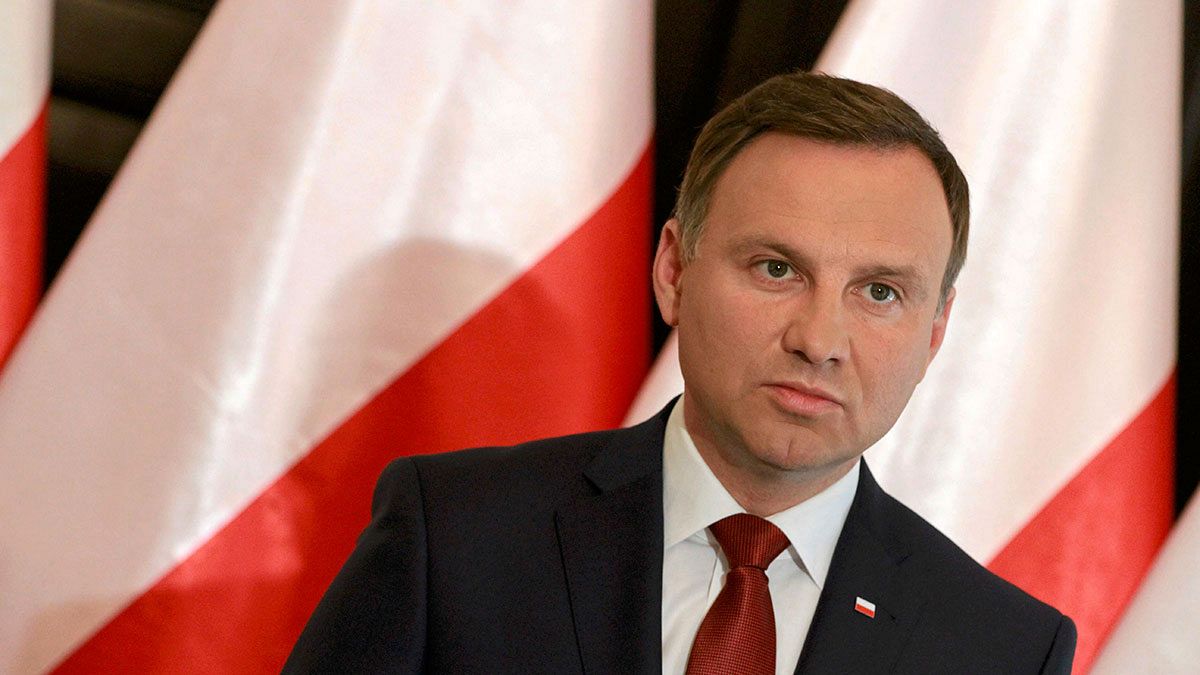Euroscepticism is growing in Poland despite it being the biggest beneficiary of Brussels’ billions, it’s been claimed.
Carnegie Europe (CE) says anti-EU sentiment is being fuelled by a Polish youth that do not appreciate membership as much as those from the communist era – a scenario Brussels is incapable of changing.
Commentators have pointed to the economic crisis, concern over perceived interference from Brussels and migration as other reasons for the country’s increasing euroscepticism.
It comes after comments from the entourage of Poland’s incoming president Andrzej Duda, which indicated the country is stepping back from further EU integration. They suggested the country would hold a referendum on joining the euro, resist further integration and fight the EU’s green policies.
Poland will receive 77.6 billion euros from the EU in the 2014-20 funding window – the highest in the EU.
Judy Dempsey, senior associate at CE, a think-tank, told Euronews: “There is a growing Euroscepticism. I think it’s a trend. It’s a trend because it’s popular to be against Brussels and the bureaucracy.
“There’s a young generation who does not remember. A young generation who did not grow up under communism and who can jump on these cheap planes and go anywhere in Europe. They don’t realise that the European Union did this.
“But it also represents the inability of the EU bureaucracy to explain what it does and what the benefits of EU membership are.”
Krzysztof Szczerski, foreign affairs adviser to Duda, told Reuters a referendum on the euro in the new president’s term, which runs to 2020, would be “pointless”.
Poland has committed to joining the euro one day, but opinion polls show if there was a vote on accession, it would be firmly rejected.
Continues below
Szczerski, rejecting closer union, said: “The metaphor of European integration being like a bike is well-known: you can only go forward, there is no reverse gear. Which means we’re in a conceptual trap.”
Duda won Poland’s presidential poll earlier this year on a Law and Justice Party ticket. The right-wing party is also predicted to triumph in parliamentary elections later this year.
If that were to happen Poland would risk its strong position in the EU, according to Pawel Swidlicki, a policy analyst at Open Europe.
He said: “If Law and Justice get in they think Poland should be more assertive towards Germany.
“Poland has done well in Europe because Tusk and his successor were close to the Merkel governments.
“If Law and Justice come in that will be risked.”
Mr Swidlicki pointed to Europe’s economic crisis, perceived interference from Brussels and migration as issues fuelling anti-EU sentiment.
He said: “Poland is more socially conservative than the European average. It would be against an EU stance on having equal marriage rights. People recognise the benefits of being in the European Union but they want to minimise what they see as the costs of membership and over interference in certain areas.”
Poland is the biggest beneficiary of EU structural funds for 2014-20, more than double the next largest, Italy, who is set to get around 33bn euros.
Warsaw joined the EU in 2004. Brussels money helped it build hundreds of kilometres of new roads, sports facilities and modern sewerage systems.
In 2003, Poland’s GDP was 192 billion euros; a decade later it was 396 billion euros.
“Since it’s joined the European Union, it’s proved very adept at playing the EU game,” said Mr Swidlicki. “Poland wants the EU on its own terms which is why it’s a much more active on energy, it’s very coal dependent and it’s fighting its corner to that end.
“Poland is just standing up for its own interests like a lot of EU member states. The question is: if there’s a change of government will it be as effective?”
Yet, despite the noise coming out of Warsaw, there is not genuine concern in Brussels over the country’s direction.
A source said: “People in Brussels understand how politics works; I don’t think they are really that frustrated with the prospect of PiS (Law and Justice Party) at the helm.
“They are not suicidal. They know that without the EU, Poland is far weaker and the economic interconnections with other member states – especially with Germany – are far too important and strong to be dismissed or undone.”
